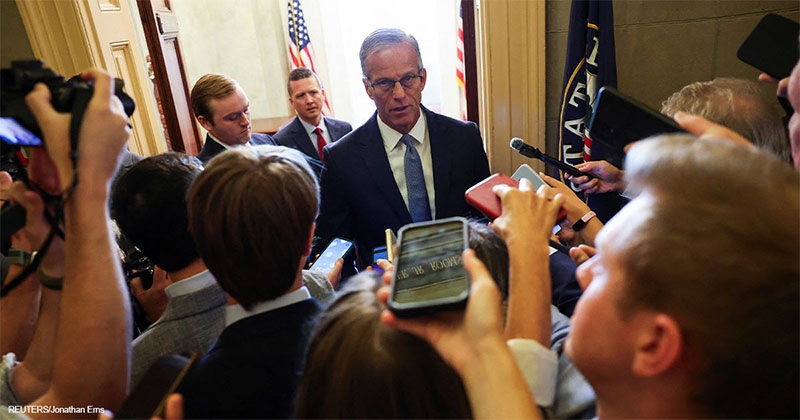
There are still a lot of empty offices in Washington, D.C. — and not from remote work. For months, the president has been trying to fill vacant jobs in his administration, only to watch Senate Democrats gleefully stonewall his nominees. Now, instead of getting to work on the business of the country, most of his picks are sitting at home, wondering if Trump’s term will end before they even get confirmed. According to Majority Leader John Thune (R-S.D.), that’s about to change.
While no one would ever mistake the Senate for an efficient body, the current HR process leaves a lot to be desired. Although there are always some partisan flashpoints with each new administration, the unspoken agreement is always to move presidents’ personnel through the pipeline as quickly as possible — especially given that about 1,200 posts require Senate confirmation. In recent years (under Trump’s two terms, especially), putting these teams in place has become more of a struggle, as the opposing parties try to make a statement by gumming up the process.
This year, though, the obstruction is otherworldly. Not a single nominee at any level has moved forward by unanimous consent or voice vote, which are the two fastest tracks for confirming a “sub-Cabinet level” nominee. Of course, the irony — or, more accurately, hypocrisy — is that Minority Leader Chuck Schumer’s party (D-N.Y.) is stiff-arming Trump’s picks, clogging up hours and hours of Senate business with time-consuming votes, then turning around and voting for them anyway. Most of these nominees are being confirmed by large bipartisan margins, Thune pointed out. “It’s Trump Derangement Syndrome on steroids.”
To break the logjam, the South Dakotan spent the weeks leading up to the August recess brainstorming ways to rewrite the rules so that future administrations don’t have to deal with this headache. Schumer, exposing just how low he’s willing to sink, had proposed lifting the holds on these nominees in exchange for billions of dollars of reinstated foreign aid — an offer that Republicans called “extortion.” “He basically wanted us to pay a ransom and contribute billions of dollars to their favorite programs … for nominees that we normally routinely got in the past,” Thune shook his head. “That’s not a good outcome.”
In an op-ed for Breitbart, the majority leader explained that he’d put together a group of Republican senators with different opinions on the process to hammer out a solution. What they landed on is nothing short of political genius, since it re-ups a proposal from Democrats — who’ve been equally frustrated when the shoe is on the other foot. Senators Amy Klobuchar (D-Minn.) and Angus King (D-Maine) had actually drafted a plan to speed up confirmations by bundling nominees together so they can be approved in batches of 10.
Thune tweaked the idea, allowing up to 48 nominations at a time, but he also didn’t apply it as broadly as Klobuchar and company had tried. Like the Democrats’ original bill, Republicans would exclude jobs that require extra scrutiny — like Cabinet secretaries, Supreme Court justices, and appeals court judges. “But the proposals share the same objective,” he insisted, “and that is providing for confirming groups of nominees all together so the president can have his team in place and so the Senate can focus on the important legislative work in its charge.”
“[W]e’re returning to the way the Senate used to work,” Senate Majority Whip John Barrasso (R-Wyo.) told Fox News “When the vast majority of nominees, after being scrutinized in committee, had their hearings voted out and sent to the floor. Then you know, Bush, Clinton — 99% of them by unanimous consent or by voice vote, and President Trump has had zero.”
To absolutely no one’s surprise, Schumer ferociously panned Thune’s proposal — even though it originated in his own ranks. As did the sentiment that the process of putting the presidents’ teams in place has been too politicized and slow over the last decade. “Regardless of the party in the White House, both sides have long agreed that a president deserves to have his or her administration in place, quickly. That doesn’t mean we don’t disagree. But it does mean when nominees are held up, opposed, or blocked — it’s for a legitimate purpose, not for leverage in partisan games, to score political points at the expense of public safety.”
Those words, the majority leader pointed out, are not his — but Schumer’s from 2022. And the Democrat was complaining, Thune wanted people to know, after Joe Biden had 405 nominees in place, “230 of whom,” he underscored, “were confirmed via voice vote.” This year, Thune highlighted, “the Senate has taken more votes than any Senate has at this point in more than 35 years. We’ve taken more roll call votes in eight months than most Senates take in 12. We’ve also spent more hours in session through August than any Senate in more than 15 years. All that to be slightly behind pace of the last two administrations’ confirmation rates.”
It’s “delay for delay’s sake,” Thune railed, “and it’s a pettiness that leaves desks sitting empty in agencies across the federal government and robs our duly elected president of a team to enact the agenda that the American people voted for in November.” Think of all that their chamber — and the administration — could be doing, he implored. “This historic obstruction also chews up valuable time on the Senate floor that would be better spent working on legislation, like moving appropriations bills on time, reauthorizing programs critical to national defense, and considering and debating some of the more than 120 bipartisan bills reported out of committee that aim to make families and businesses stronger and more prosperous.”
A whopping 149 nominees are in the queue for a floor vote as we speak, and dozens more are in the congested committee pipeline. “So if Democrat obstruction continues — as Democrats have made abundantly clear that it will – there is no practical way that we could come close to filling all the vacancies in the four years of this administration, no matter how many hours the Senate works,” Thune shook his head.
To shake some of the names loose, Republicans are putting a resolution on the floor Thursday to change the way the process is handled. Assuming the vote fails to get the 60 yeas it needs, Thune will activate the “nuclear option” to change the rules — a last resort option that both parties have used over the last several years to make the confirmation process more manageable. Most people expect that to kick the action into late next week.
“This isn’t about the quality of the candidates or any other substantive issue,” the Republican leader reiterated. “This is simply the world’s longest, most drawn-out temper tantrum over losing an election. Democrats can’t stand the fact that President Trump was elected.” If Trump’s nominees were “historically bad,” as Democrats claim, he argued, they wouldn’t vote for several of them in committee or in final floor confirmation votes.
Under this arrangement, Family Research Council President Tony Perkins joked on “Washington Watch” Tuesday, even Mother Theresa wouldn’t have been confirmed. Probably not, Senator Steve Daines (R-Mont.) agreed. Democrats are just frustrated, he said, “and they’re expressing that frustration.” And, he pointed out, “their liberal base is telling them to fight. Well, this is the way they’re fighting here is by obstructing the U.S. Senate. It’s not fair to the nominees, because you want good people to serve in government,” he insisted. “And if you pick a good person … how can they stand around and wait for a year for the Senate to act? They can’t.”
In the 236 years of this chamber, Daines underscored, “never before in the history of the U.S. Senate have we seen this kind of obstruction.” Did Republicans try to slow down Biden? Sure, the senator admitted. But the GOP still approved about 60% of his personnel by voice vote. Now, it’s 0%. “Unprecedented.”
Of course, Democrats are trying to convince people that the sky is falling with these changes, using the “nuclear” language and warning that this is a decision Republicans will regret. Is that just saber-rattling, Perkins asked?
Daines nodded. It’s overstating the reality of what’s really happening. If we prevail,” he said, “which I think we will [with this new precedent], all it will do is restore the Senate back to the way it used to operate, which is through more unanimous consent.”
At the end of the day, his Kansas colleague, Roger Marshall (R), told the press, “[T]hey’re forcing us to do something. There’s nothing nuclear about it. … Again, this is their bill.” Even so, he smiled, “It’s great to watch them squirm as they try to figure out what to do with this.”
















